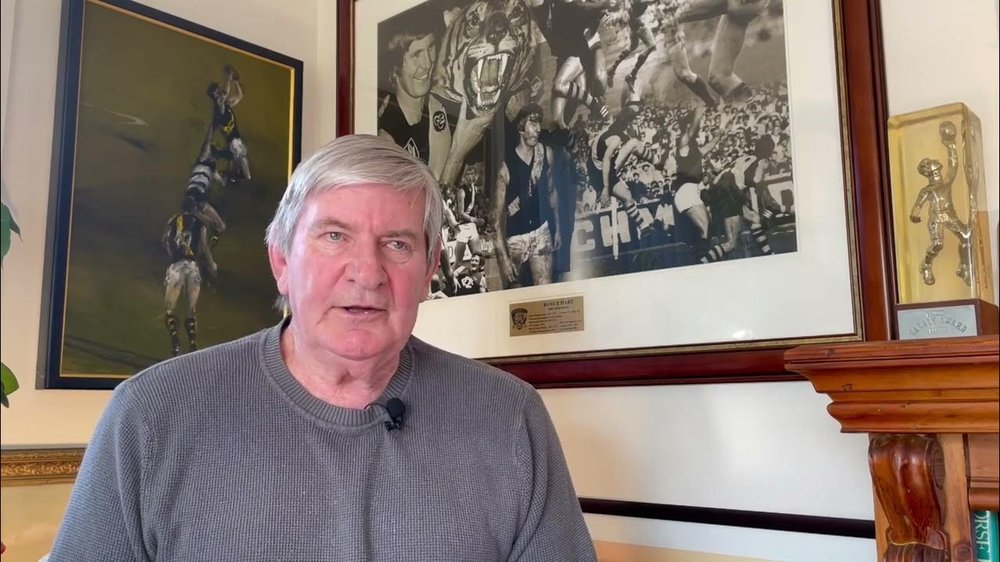Royce Hart
29 February 2024
Australian Football Hall of Fame legend Royce Hart believes Tasmania’s entry into the AFL will return football in his home state to the glory years of the past.
Hart greeted news of Tasmania’s AFL licenses with great enthusiasm but also a feeling that it was long overdue.
“Well I thought that should’ve been done 20 years ago,” he said.
“All I said was about time.”
As a child, Hart remembers listening to Tasmania’s famous win over Victoria in 1960 on the radio. This followed victories over Western Australia and South Australia at the 1958 carnival.
He is confident Tasmania will become a strength in football again.
“When we come into the competition, we’ll be alright… [Once] the players start flowing through from their home state into the Tasmanian AFL team it will go back to what it was 50 years ago.”
Hart, who was named at centre-half-forward in the AFL, Richmond and Tasmanian teams of the century, has called for special concessions to be made allowing for the new club to access the best home-grown talent.
“There must be a moratorium on the number of players that can go in the draft from Tasmania and we have to retain three or four of the top players,” he said.
There was no such thing as the draft in 1965, when a teenage Hart was forced to leave his home state to pursue his football dreams.
Plucked from the Clarence under 19’s and having never played senior football, he famously signed with the Tigers for the princely sum of six shirts and a suit and went onto become one of the game’s greatest players.
But had Tasmania had its own team, Hart would never have left.
“I’d have played for Tasmania, no doubt about that,” he said emphatically.
Very much a country boy, he recalls fondly his childhood on the family farms at Whitefoord and Orielton, where draft horses were used to clear the land.
Football became an early passion and Hart remembers spending hours kicking at targets in the roof of the barn as a way of honing his skills.
He won premierships playing with Sorell Area School in grade five and six before going to Clarence High School, where football training was held on a Tuesday night. With his father unable to pick him up, hitchhiking home was routine.
“We would walk from Clarence High to the East Coast Rd and if we didn’t thumb a lift we’d be there all night.”
“Our parents didn’t mind because they thought we were safe.”
While football playing children of today are seen frolicking in a kaleidoscopic assortment of footwear, Hart never owned a pair of football boots while he lived in Tasmania.
He remembers buying a pair of white-laced Jenkin boots prior to training with Richmond using money he had earned working at the Commonwealth Bank.
In Tasmania, Hart and many others of his generation were forced to make do with leather stops nailed into their school boots.
“I would put the stops in for the game on the Saturday and then take them out on the Sunday and wear them to school,” Hart recalls.
“If you didn’t get it right the nails or the tacks would come through and you would play with blood coming out of your foot.”
From humble beginnings, Hart went on to play in four premierships with Richmond, captaining the Tigers during the successful 1973 and 74 campaigns.
After his career ended due to persistent knee injuries in 1977, he coached the Richmond reserves before an unsuccessful two-and-a-half year stint as senior coach at Footscray.
Today he leads a quiet life on the outskirts of Hobart. Huon Pine furniture and football memorabilia fills his home, while Hart takes great enjoyment from indulging in his passion for history.
But the thing he loves most is Tasmania’s natural environment. Prior to moving to Melbourne, a young Hart had never been up Mount Wellington, in retirement Hobart’s imposing backdrop has become his favourite place to visit.
Fresh air and freedom and I think it’s [Tasmania] the best place of any place I’ve been to in the world,” he said.
